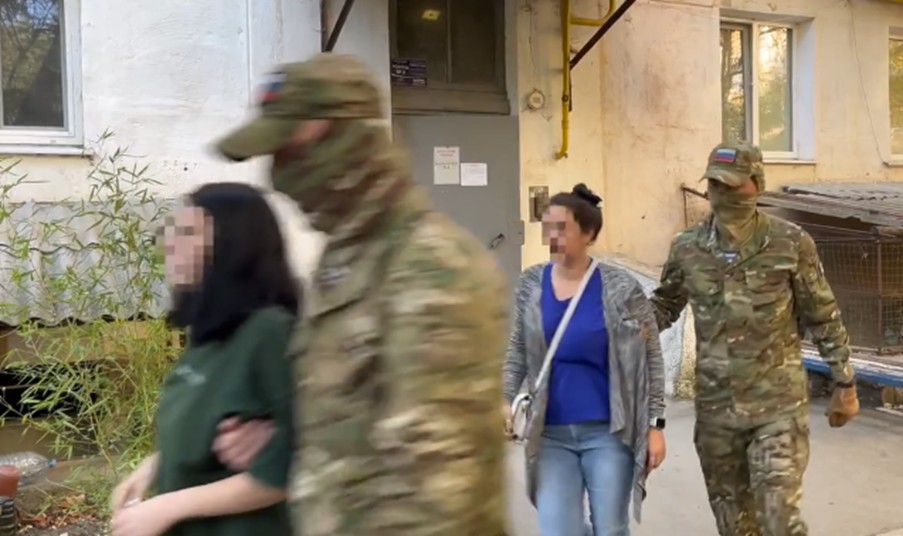Mother and daughter sentenced to 12 years in Russia’s conveyor belt ‘treason trials’ in occupied Crimea

In the space of just two days, Crimean occupation ‘courts’ passed massive sentences against three Ukrainians, including a mother and daughter. Both the charge – of ‘treason’ against Russia and basic elements of the indictment appear to be near identical to very many others, So too are critical elements of the ‘trials’, in particular the fact that these are held behind closed doors, with virtually nothing known about them.
Victoria Strilets and Oleksandra Strilets
On 5 August, the occupation ‘Sevastopol city court’ found 42-year-old Victoria Strilets and her 24-year-old daughter Oleksandr Strilets ‘guilty’ of treason, under Article 175 of Russia’s criminal code, and sentenced each of the women to twelve years in a medium-security prison colony, to be followed by a year of restricted liberty.
It was claimed that Oleksandra Strilets “had decided, for remuneration, to cooperate on a confidential basis with representatives of Ukraine against the security of the Russian Federation.” She had, purportedly, also got her mother involved in this and had, in September 2023 passed photographs, taken by her mother, of sites of the Russian armed forces to a Messenger channel controlled by Ukraine’s Military Intelligence.
Essentially all these ‘trials’ are based on accusations that the person passed on information about the Russian armed forces, their places of deployment, etc. either to Ukraine’s Military Intelligence or to its Security Service [SBU].
There is one apparent deviation from Russia’s standard, conveyor belt prosecutions, namely the claim by the Sevastopol ‘prosecutor’ that the two women had been taken into custody in the ‘courtroom’. One of the photos evidently circulated by the FSB shows the women clearly being detained. They could, of course, have been released later, perhaps under a signed undertaking, however this would certainly be a first in all the years that Russia has been occupying Ukrainian territory. Since 2022, in particular, the FSB or Russian soldiers have been aducting both men and women and holding them incommunicado for months or years. During such periods, the victims, who have generally not been formally charged, are subjected to torture and / or other forms of pressure to force them into ‘confessing’ / ‘admitting guilt’.
Although the ‘trial’ was held behind closed doors, Crimean Process notes its blitzkrieg nature, with this very likely pointing to pressure having been brought to bear on the two women. The ‘court hearing’ took place in the afternoon of 22 June, with the sentence passed within five hours of the next hearing, on 5 August. The human rights monitors noted that nine hours could not possibly be sufficient time to study the material concerning such grave charges.
This was the first ‘trial’ before ‘judge’ Daniil Zemlyukov, a Russian illegally sent to occupied Crimea from Barnaul
Crimean Process explains that the women’s arrest was first reported on 3 October 2024. At that stage, they were charged under Article 275.1 of passing on information on a confidential basis. In June 2025, it was learned that the case had been passed to ‘the court’ on the much more serious charge of ‘treason’ under Article 275 of Russia’s criminal code.
Oleksandr Osadchy
Whereas the Russian occupation ‘prosecutor’ named Victoria and Oleksandra Strilets as the two women sentenced to 12 years, the name of the third victim was not mentioned. Through its sources, however, Crimean Process has learned that the ‘defendant’ was 31-year-old businessman from Feodosia Oleksandr Osadchy. He was abducted, and held incommunicado from at least February 2024 in SIZO No. 2, one of the remand prisons which the aggressor state opened after its full-scale invasion of Ukraine. SIZO No. 2 is believed to be under the control of the FSB and is being used to imprison Ukrainian political prisoners and civilian hostages.
The sentence on 6 August 2025 was handed down by ‘judge’ Natalia Kulinskaya from the occupation ‘Crimean high court’. Kulinskaya has already been implicated in passing politically motivated sentences against Ukrainian civic journalist and human rights defender Iryna Danilovycn and abducted Crimean Tatar Ismail Shemshedinov.
It was claimed that in November 2023, due to his opposition to what Russia euphemistically dubs its ‘special military operation’, Osadchy had, while near Feodosia, collected information about the movement of a locomotive carrying oil. He had sent the relevant video and geolocation to a chat-bot used by Ukraine’s Military Intelligence.
Here too the ‘trial’ took place behind closed doors, lasting all of three ‘hearings’ before Kulinskaya sentenced the abducted Ukrainian to 18 years maximum-security imprisonment.





